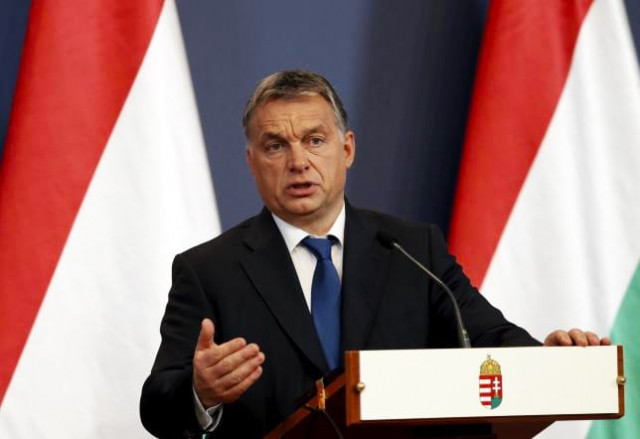Hungary's anti-immigrant PM faces workforce shortage
The premier has often argued that immigration cannot compensate for labour shortages

The conservative Orban, in power since 2010 and a father of five himself, has attempted to redress the dire situation with a raft of measures aimed at getting Hungarians to have more babies or return from abroad. PHOTO: REUTERS
Hungary, an EU member since 2004, has seen 400,000 people leave the country since 2008, and 850,000 over the past 35 years.
Unwelcome sign: No let-up in human trafficking
In addition, since the 1980s, the ex-communist central European country has had one of the lowest birth rates in Europe, bringing the overall population below the 10-million mark.
As a result, at least a quarter of Hungarian firms are experiencing problems finding workers, said the Confederation of Hungarian Employers and Industrialists (MGYOSZ) in a recent study.
"The Hungarian economic train can't get out of the station because there are no wheels," said the report.
Call centre employee Mark Stern and his teacher wife Rita, about to move to Ireland with their toddler Marci, are among the latest to join the exodus.
"We have friends in Ireland, we speak English and there are lots of opportunities for people there who want to work," Rita, 32, told AFP in Gyomro, a town outside Budapest, as she made her farewells.
The conservative Orban, in power since 2010 and a father of five himself, has attempted to redress the dire situation with a raft of measures aimed at getting Hungarians to have more babies or return from abroad.
Islam has ‘no place’ in my country, says next EU president
Since June, Hungarians returning have been able to benefit from a welcome-back present of 3,000 euros ($3,330) as well as help finding work and accommodation.
Only 105 people have taken up the offer since June 2015, however.
Couples planning to have three children in the next decade, or those with three kids already, can get 10 million forints (35,700 euros, $35,480) towards buying a property, and a low-interest loan of the same amount.
More than 12,500 people have signed up for this scheme in the past year, contributing to a rise in real state prices of between 10 and 30 percent, according to economists.
There is more the government can do, said Balazs Kapitany, head of the national demographics office, not least when it comes to red tape for re-entering the education and health systems.
But longer term, he says, it will be difficult for Hungary's population to grow.
"The children from Hungary's 1970-75 baby boom will soon be too old to have children, and the succeeding generations are not very numerous," he said.
Surge in EU immigrants fuels Brexit campaign
The answer, and one turned to by other European countries facing similar, if less acute, challenges may be immigration, Mihaly Varga, Hungary's economy minister, said last week.
But, in spite of employer woes, importing workers would be a difficult measure to swallow for a government that has put up billboards telling foreigners not to take Hungarians' jobs.
The premier has often argued that immigration cannot compensate for labour shortages, and has been anything but welcoming to foreigners, particularly Muslims, in the last year.
The influx of mostly Muslim refugees and migrants into the EU over the last 12 months poses a security threat and threatens the continent's Christian identity, Orban has said.
Around 400,000 migrants and refugees passed through Hungary in 2015 before the government sealed off the southern borders with razor wire and fences.
An EU plan for member countries to take in migrants according to a mandatory quota meanwhile has also been furiously slammed by Budapest which will put the issue to a referendum in October.
The need to reconcile Orban's anti-foreigner stance with Hungary's growing demand for new sources of manpower looks though to have already caused a shift in approach.
According to Varga, the ministry is mulling a plan by MGYOSZ that proposes allowing non-EU citizens to live and work in the country.
The scheme could copy countries like Poland, the body said, where around one million people from neighbouring Ukraine are employed.
Labour shortages in sectors like tourism and construction could be filled by "skilled, culturally integrable guest workers," according to MGYOSZ.



















COMMENTS
Comments are moderated and generally will be posted if they are on-topic and not abusive.
For more information, please see our Comments FAQ